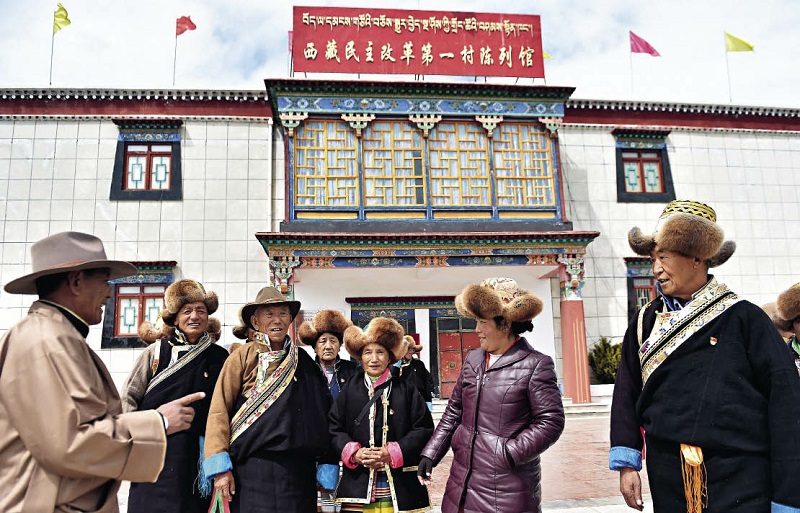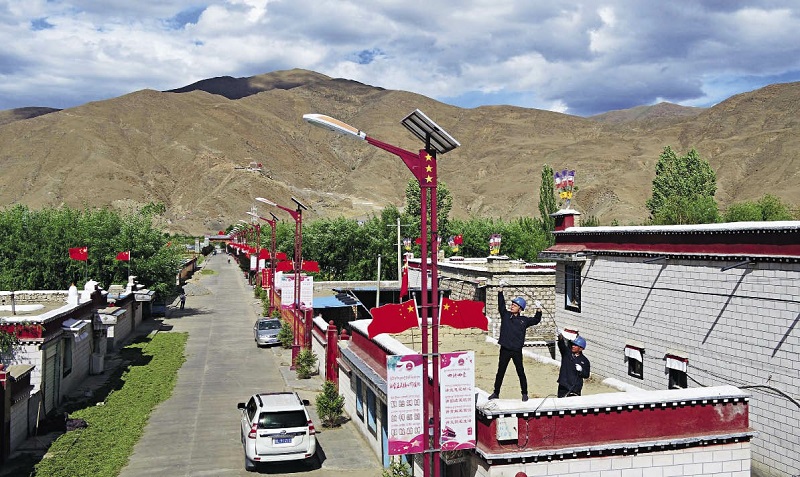Memories of the dark days in the serfdom era come flooding back whenever Lobsang Dolma, 79, passes through the entrance gate of her village. Some 60 years ago, hanging over the gate was a mace representing the authority of the Soikang family, owner of the then Kesum Manor.
“[The mace] symbolized the misery of serfs’ lives in Kesum Manor,” said Lobsang recalling her abhorrence of the Soikang family, self-styled as descendants of the fourth Dalai Lama.
In 1959, Tibet’s epoch-making democratic reform ending serfdom began in Kesum Village, which witnessed the founding of the first farmers’ association and the first Communist Party of China (CPC) branch in rural areas of southwest China’s Tibet Autonomous Region.
Today, spacious streets, well-furnished Tibetan houses, and locals beaming with contentment with their lives, all bespeak a prosperous life in Kesum, the vanguard of Tibet’s democratic reform.

The elderly from Qusum County of Tibet’s Shannan City visit Kesum Village, where Tibet’s democratic reform was launched in 1959, learning about its modern development.
Brutal Serfdom
The brutality of serfdom is recounted in a memorial hall in Kesum, a village that is now transformed into a modern residential community, in Shannan City. Images of the dilapidated shacks serfs lived in and the horrible instruments of torture and cages used for punishing and locking up disobedient serfs are on display and are indicative of how difficult life could be under the rule of serf owners.
In Kesum Manor some six decades ago, the Soikang family compelled 302 serfs to work day and night, treating them as mere tools. For their painstaking labor, serfs received nothing but a little food, a shabby roof over their heads, and often a torrent of physical abuse.
“Serfs led an unimaginably miserable life, even worse than how it is presented in the memorial hall,” said 78-year-old Solang Thondup, former Party chief of Kesum Village.
In 1968, local residents created a theatrical version of their history. In the play of Tears of Serfs, a starved serf was beaten up savagely by the butler of a lord family for robbing food from a dog. His protests only led to even more brutal torture. His wife was devastated by his eventual death, and his two revengeful sons were subsequently also tortured to death by the serf owner.
The play’s staging often ended up with audiences’ outpouring of sympathy, grief, and abhorrence for this dark period in their history.

Technicians from the State Grid’s Anhui provincial company are fixing power and communication cables in Kesum Village, the vanguard of Tibet’s democratic reform.
A Great Change
On March 28, 1959, China’s central government issued an order to dissolve the old government in Tibet following an armed rebellion. Democratic reform was initiated to emancipate local people from the shackles of the feudal serfdom system.
At the time, Tenpa Gyaincain was a student in the Chengdu-based Southwest Minzu University. He volunteered to go back to Tibet and contribute to quelling the rebellion. In Kesum, he witnessed the dire impoverishment people were suffering and swelling anti-oppression sentiments. He wrote in his social survey report, “People in Kesum have long had enough of the exploitation and oppression by their serf owners. The place is a textbook for understanding the evil essence of Tibetan serfdom and can become an educational base for Tibetan serfs unshackling themselves from the feudal system.”
The working group for Tibetan affairs set up by the CPC Central Committee then decided to pilot democratic reform in Kesum Village.
On June 6, 1959, a total of 302 former serfs, dressed in ragged clothes, exercised their power as free people, and elected the first preparation committee for the first farmers’ association in Tibet. On July 5, the farmers’ association was officially inaugurated, fulfilling the wishes of local residents for generations by giving them parcels of land.
Nyima Tsring was elected president of the farmers’ association. “Fellow villagers, sitting at the table used to be the privilege of serf owners, and we serfs could only be trampled upon and live with our knees forced on the ground. Today, the CPC has emancipated us, and enabled us to stand up,” he proclaimed at the first villagers’ meeting.
The democratic reform abolished feudal land ownership. Serfs and slaves, who made up more than 95 percent of the total population at that time in Tibet, gained their own land and other means of production for the first time.
In December of the same year, the first rural Party branch in Tibet was also established in Kesum Village. Five villagers, including Solang Thondup’s father, were accepted as members of the Party.
Led by the Party branch and Party members, villagers enthusiastically devoted themselves to building a better life.
Thondup has been a witness to the upending changes since then. “Party members have been playing a leading role over the years,” he said.
In the 1980s, villagers made use of their geographical adjacency to urban areas and started up businesses to serve urban residents. Dawa Tsering, a villager, built up a successful starch-noodles-making business, creating jobs for fellow villagers.

One poignant scene from an on-stage performance of Tears of Serfs.
A Bright Future
In mid-March, more than 200 local residents dressed up for an annual grand ceremony initiating spring farm work. The jubilant crowd was elated at the introduction of 16 seeding machines and enthusiastically set about planting the season’s highland barley crop.
“Spring ploughing is the most important farm work throughout the year in Tibet,” said Dekyi, 73. With the widespread use of agricultural machinery, farmers no longer have to do the farm work manually and more people have migrated to find better jobs in urban areas, but the ceremony still attracts people to return home.
In 2020, residents in Kesum, on a voluntary basis, transferred their farmland use right to a government-funded cooperative for planting vegetables in a more efficient manner. After that, seven in 10 of the working-age population in the community could leave to seek work elsewhere, being assured that their transferred land would bring them sizable returns. Lobsang Wangchuk transferred his family’s use right of 0.4 hectare of farmland to the cooperative. Free to work as a cab driver, he earned more than RMB 100,000 last year without having to worry about his land.
Now, Kesum is home to 168 Party members in 12 Party branches, which give strong support to efforts in building a moderately prosperous society.
“In 2021, we plan to transfer another 9.3 hectares of farmland to the cooperative,” said the newly-elected Party chief Gangzu in Kesum.
With each round of land reform, the meaning of farmland to people changed drastically from a workplace in the former serfdom era, to assets owned by emancipated serf families, and then to today’s contribution to hold shares in an agricultural cooperative. The reform has meant an increase in productivity and improved production efficiency.
Since the 18th National Congress of the CPC in 2012, the central authorities have invested nearly RMB 40 million in Kesum in renovating public facilities and building a resident’s service center and a library. In 2017, local residents bid farewell to poverty. The average annual income per capita hit RMB 25,000 in 2020. By contrast, the national average for rural residents in the year was RMB 17,131.
Now, the village is poised for new development initiatives to increase people’s incomes. It plans to make use of its easy access and revolutionary culture to create an agro-tourist business integrating catering, lodging, and recreational services.
Pema Techung, a student in Zhejiang University, is proud of the positive changes happening to her hometown. “I will return to my hometown and contribute to building and improving it when I graduate,” she said.
NORBU TSERING & WANG ZEHAO are reporters with Xinhua News Agency.